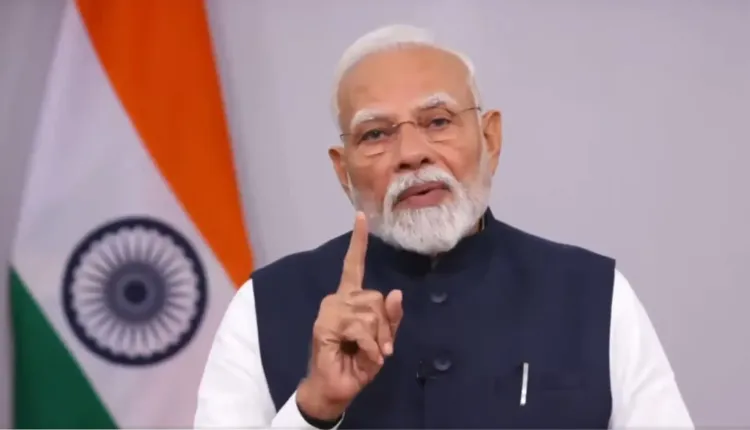India Needs to Enhance Steel Production to Reach 'Zero Imports & Net Exports' Objective: PM Modi

Synopsis
Key Takeaways
- Zero imports and net exports are essential goals for the steel sector.
- India targets 500 million tons of steel production by 2047.
- Collaboration in manufacturing and R&D is crucial for job creation.
- Government initiatives will ensure the use of ‘Made in India’ steel.
- India aims to lead globally in high-quality steel production.
New Delhi, April 24 (NationPress) Prime Minister Narendra Modi on Thursday emphasized the necessity of aiming for zero imports and prioritizing net exports in the steel sector, stating that India is working towards a target of exporting 25 million tons of steel and increasing production capacity to 500 million tons by 2047.
Speaking at the India Steel 2025 initiative from Mumbai via video link, PM Modi stressed the importance of equipping the steel sector for innovative processes, grades, and scales, urging the industry to expand and modernize with a future-oriented approach.
"Today, we take pride in the fact that India has become the second largest steel producer globally. Our target is to produce 300 million tonnes of steel by 2030 as outlined in the National Steel Policy," he noted.
The Prime Minister highlighted the significant employment potential within the steel industry and called on both private and public sectors to foster, develop, and share innovative ideas. He emphasized the need for collaboration in manufacturing, R&D, and technological advancements to create more job opportunities for the nation’s youth.
He also pointed out that the $1.3 trillion National Infrastructure Pipeline is being propelled to expedite ongoing projects, which would generate new opportunities for the steel sector.
The infrastructure projects under the National Master Plan encompass extensive initiatives to convert cities into smart cities, along with an accelerated pace in developing roads, railways, airports, ports, and pipelines, thereby creating additional opportunities for the steel sector, the Prime Minister stated.
Numerous houses are being constructed under the PM Awas Yojana, and significant infrastructure is being developed in villages through the Jal Jeevan Mission, he added. He remarked that welfare initiatives like these are also bolstering the steel industry.
He underscored the government’s commitment to using only ‘Made in India’ steel for government projects and noted that government-led initiatives account for the highest steel consumption in construction and infrastructure.
Reiterating that steel is a fundamental element driving the growth of various sectors, PM Modi remarked that government policies for the steel industry are crucial in enhancing the global competitiveness of many other industries in India.
He pointed out that sectors such as manufacturing, construction, machinery, and automotive are gaining momentum from the Indian steel industry. He mentioned that the government has launched the National Manufacturing Mission in this year’s Budget to accelerate the 'Make in India' initiative. This mission supports small, medium, and large industries, providing new opportunities for the steel sector, he added.
Reflecting on how India was historically reliant on imports for high-grade steel, which is essential for defense and strategic sectors, the Prime Minister expressed pride that the steel used in India’s first indigenous aircraft carrier was manufactured domestically. He also noted that Indian steel played a vital role in the success of the historic Chandrayaan mission, symbolizing India’s capabilities and confidence.
He remarked that this transformation was made possible through initiatives like the PLI scheme, which has allocated thousands of crores to facilitate the production of high-grade steel. He emphasized that this is merely the beginning, with a long journey ahead.
He noted the increasing demand for high-grade steel due to mega-projects across the nation. He mentioned that in this year’s Budget, shipbuilding has been classified as infrastructure. "India aims to manufacture modern and large ships domestically and export them globally," he stated.
The Prime Minister highlighted the rising demand for pipeline-grade steel and corrosion-resistant alloys in India. He remarked that the nation’s rail infrastructure is expanding at an unprecedented speed.
Recognizing that the steel industry faces certain challenges that need to be addressed for further growth, particularly highlighting that raw material security remains a major concern—given India’s continued dependence on imports for nickel, coking coal, and manganese—he stressed the importance of strengthening global partnerships, ensuring supply chains, and focusing on technology upgrades. He underscored the need to swiftly transition towards energy-efficient, low-emission, and digitally advanced technologies.
"The future of the steel industry will be influenced by AI, automation, recycling, and by-product utilization," he asserted.
Emphasizing the significance of addressing the issue of unused greenfield mines, PM Modi noted that substantial mining reforms have been implemented in the last decade, facilitating easier availability of iron ore.
The Prime Minister highlighted that India is no longer concentrating solely on domestic growth, but is gearing up for global leadership. He stated that the world now perceives India as a reliable supplier of high-quality steel. He reiterated the necessity of maintaining world-class standards in steel production and continuously upgrading capabilities.
Enhancing logistics, developing multi-modal transport networks, and reducing costs will position India as a Global Steel Hub, he concluded.










